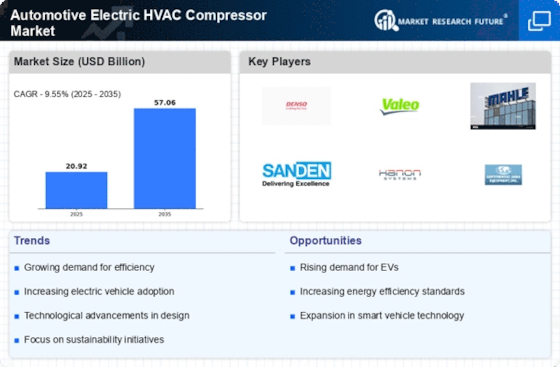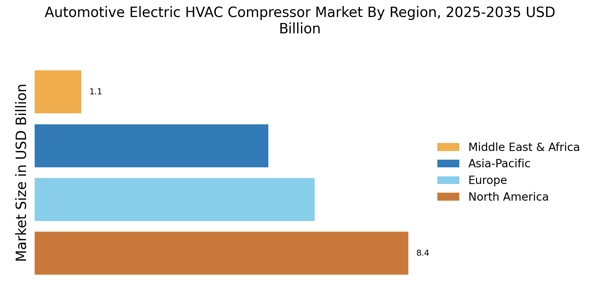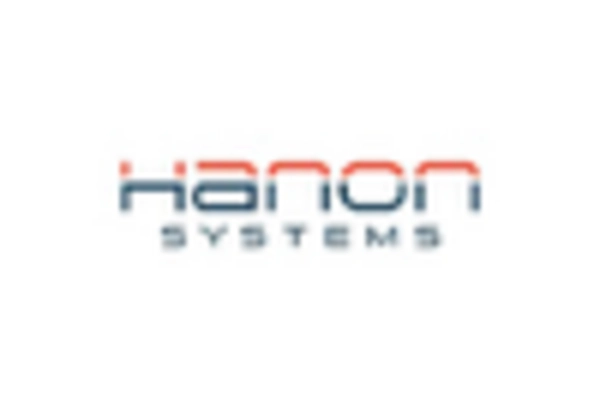Integration of Smart Technologies
The integration of smart technologies into automotive systems is emerging as a key driver for the Automotive Electric HVAC Compressor Market. With the rise of connected vehicles, there is a growing demand for HVAC systems that can be controlled remotely and optimized for energy efficiency. Smart HVAC compressors can adjust their operation based on real-time data, enhancing user experience and energy savings. Recent trends suggest that the market for smart automotive technologies is expanding rapidly, with projections indicating a potential growth rate of over 15% annually. This trend towards smart integration is likely to propel the Automotive Electric HVAC Compressor Market forward.
Increasing Demand for Energy Efficiency
The Automotive Electric HVAC Compressor Market is experiencing a notable surge in demand for energy-efficient solutions. As consumers become more environmentally conscious, automakers are compelled to adopt technologies that reduce energy consumption. Electric HVAC compressors, which utilize less power compared to traditional systems, are increasingly favored. According to recent data, electric compressors can enhance vehicle energy efficiency by up to 30%. This shift not only aligns with consumer preferences but also meets regulatory standards aimed at reducing carbon emissions. Consequently, the growing emphasis on energy efficiency is a pivotal driver for the Automotive Electric HVAC Compressor Market.
Advancements in Electric Vehicle Technology
Technological innovations in electric vehicles (EVs) are significantly influencing the Automotive Electric HVAC Compressor Market. As EV adoption rises, the need for compatible HVAC systems that can operate efficiently on electric power becomes paramount. Recent studies indicate that the market for electric vehicles is projected to grow at a compound annual growth rate of over 20% in the coming years. This growth necessitates the integration of advanced electric HVAC compressors that can maintain optimal cabin temperatures without compromising battery life. Thus, advancements in EV technology serve as a crucial driver for the Automotive Electric HVAC Compressor Market.
Consumer Preference for Comfort and Convenience
In the Automotive Electric HVAC Compressor Market, consumer preferences are shifting towards enhanced comfort and convenience features in vehicles. Modern consumers expect advanced climate control systems that provide consistent and customizable cabin temperatures. Electric HVAC compressors offer precise temperature regulation and faster response times compared to traditional systems. Market Research Future indicates that vehicles equipped with advanced HVAC systems are perceived as more desirable, leading to increased sales. This growing consumer demand for comfort and convenience is a vital driver for the Automotive Electric HVAC Compressor Market, as manufacturers strive to meet these expectations.
Regulatory Compliance and Environmental Standards
The Automotive Electric HVAC Compressor Market is increasingly shaped by stringent regulatory frameworks aimed at promoting sustainability. Governments worldwide are implementing regulations that mandate lower emissions and improved energy efficiency in vehicles. For instance, the European Union has set ambitious targets for reducing greenhouse gas emissions from the automotive sector. As a result, manufacturers are compelled to innovate and adopt electric HVAC compressors that comply with these regulations. This regulatory pressure not only drives technological advancements but also enhances the market potential for electric HVAC systems, making it a significant driver in the Automotive Electric HVAC Compressor Market.


















